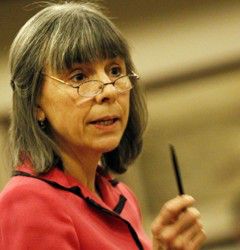
State representatives and private citizens debated increased restrictions on the ballot initiative process and other constitutional amendments at the Joint Committee on Election Laws hearing on Wednesday.
The committee, comprised of state senators and representatives, listened to testimony from people for and against the ballot initiative process.
Democratic Rep. Denise Provost sponsored the amendment, which would raise the threshold for the number of signatures needed to place an initiative petition on the ballot.
Petitions would need 7 percent of the number of votes as opposed to the current 3 percent.
“Civic participation has decreased so much that an increasingly tiny proportion of voters gets to decide what is on the ballot,” Provost said.
The Massachusetts system could deteriorate into something like California’s, she said, where it is “far too easy to get often contradictory things passed.”
A lack of information could warp citizen voters’ ability to decide on important issues, she said.
“Voters don’t know what to think and get persuaded by advertisements and slogans,” Provost said.
Chris Condon, who testified in support of the amendment, said he wanted more restrictions in the ballot initiative process, because ballot outcomes are “based on who has more money.”
Other proposals introduced which would call for higher regulation included the prohibition of payment for signature gathering, ensuring that volunteers would be dedicated to the cause instead of working for pay.
Not everyone agreed that the system needs higher regulation and said that the process is already too restricted.
“We need to increase citizen participation in state government, not suppress it,” said Republican Rep. Jim Lyons. “Nothing strengthens the democratic system more than increased citizen involvement, such as through signature gathering on ballot initiatives.”
“We must acknowledge that ultimate authority lies not with elites, but with citizens,” he said. “I ask that you vote against this attempt to restrict voters.”
Representatives from Citizens for Limited Taxation and the Massachusetts Public Interest Research Group testified in opposition to the amendment, stressing the difficulties in the current process.
“The process to get something on the ballot is not easy. The threshold is low,” said Chip Faulkner, associate director of CLT. “However, unlike other states which have months or years to get the number of votes, Massachusetts gives petitions seven weeks.”
“The stray mark ruling also means that a fingerprint or a coffee stain will disqualify any signatures on that paper. . .I think legislators just don’t like the idea of citizens deciding these issues instead of politicians,” he said.
Although the majority of time was spent debating the ballot initiative process, other amendments were discussed as well.
Democratic Rep. Harriet Stanley proposed a no excuse absentee ballot system which 30 states now maintain. The system would allow every citizen to qualify for an absentee ballot without a specified reason. Stanley said voter participation could increase 2 to 4 percent without the potential for voter fraud.
Common Cause, a non-profit organization seeking to ensure the accountability of government, proposed a bill to strengthen the partnership between the governor and lieutenant governor to prevent “a real chaos situation.”
Another called for an independent commission to redistrict Massachusetts to prohibit partiality.
One bill proposed to shorten the terms of General Court members from four years to two. However, Common Cause opposed term limits on political officials.
“Shortening term limits would reduce the effectiveness of political officers,” said Reade Everett, the law fellow at “Common Cause.” “Overall, such action would be harmful to the democratic process, transferring power to those with money, particularly lobbyists.”
This is an account occasionally used by the Daily Free Press editors to post archived posts from previous iterations of the site or otherwise for special circumstance publications. See authorship info on the byline at the top of the page.



